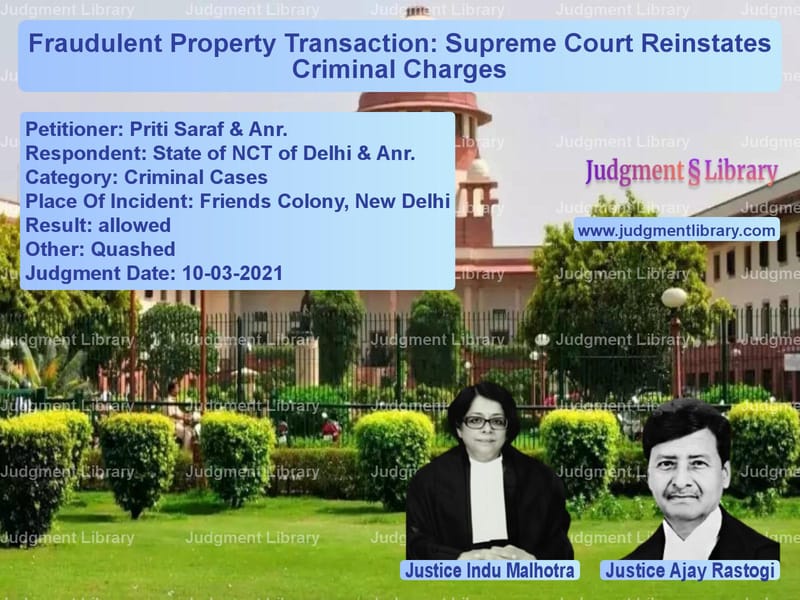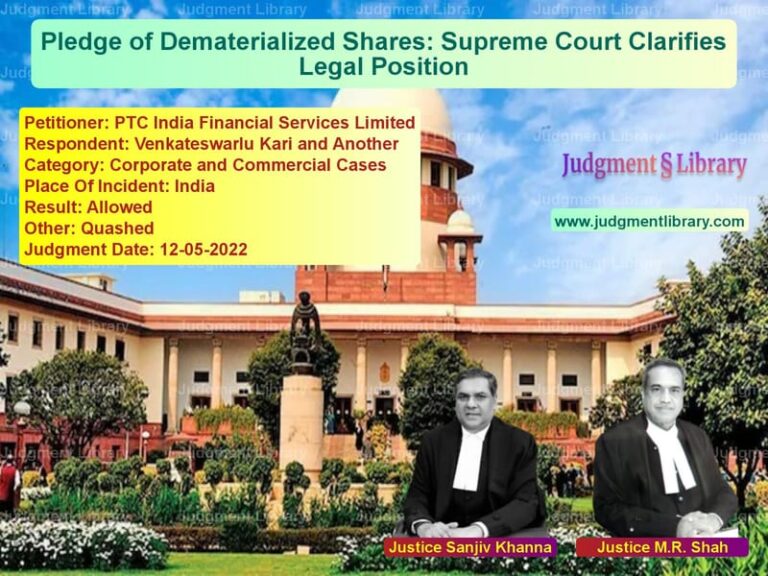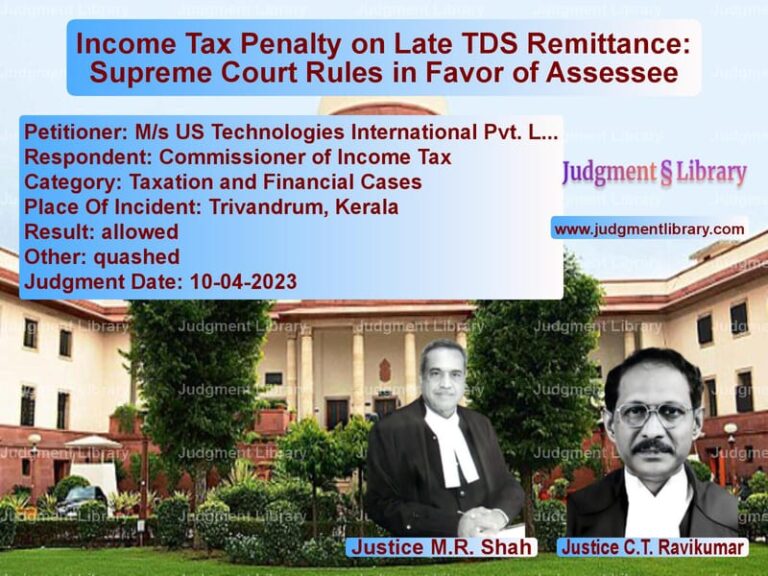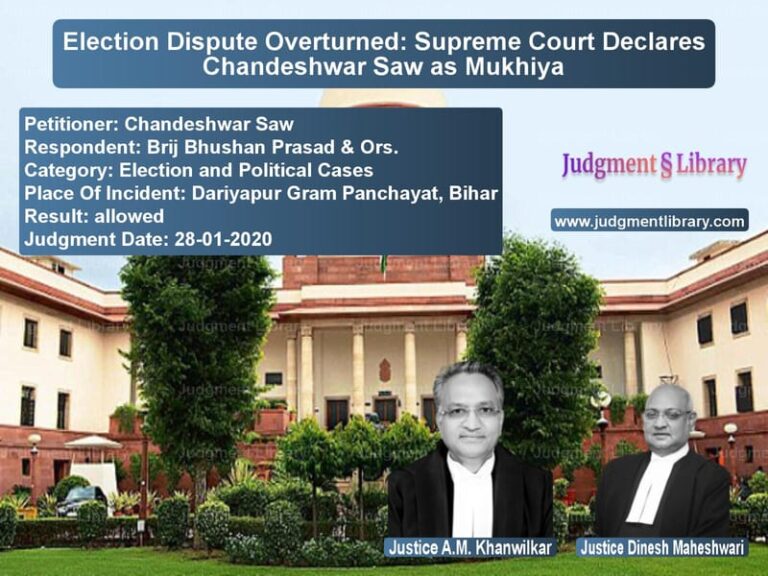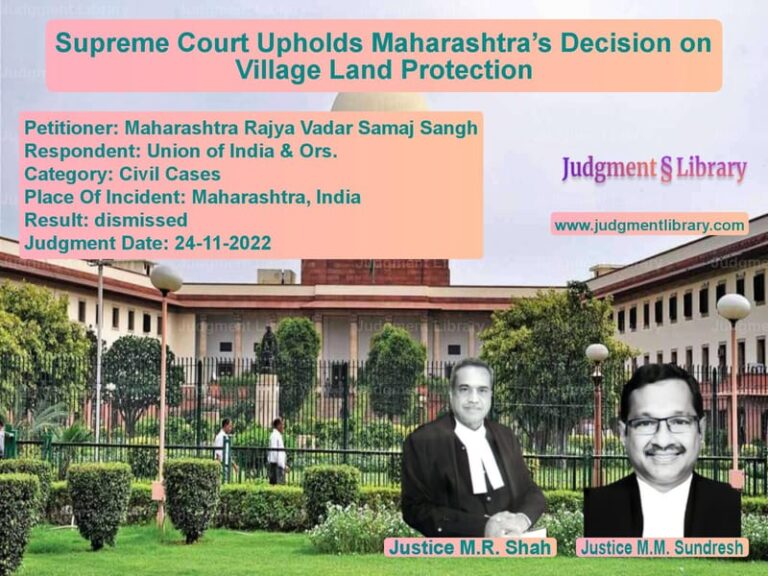Fraudulent Property Transaction: Supreme Court Reinstates Criminal Charges
The case of Priti Saraf & Anr. vs. State of NCT of Delhi & Anr. is a landmark ruling by the Supreme Court of India, which examined the intersection between criminal law and civil disputes. The case primarily revolved around allegations of cheating, criminal breach of trust, and conspiracy in a high-stakes property transaction in Delhi. The dispute stemmed from an agreement to sell a property, where the complainants alleged that the accused fraudulently took a substantial sum of money while failing to fulfill contractual obligations.
The case raises important legal questions regarding when a commercial dispute can give rise to criminal proceedings and under what circumstances a court should intervene to quash an FIR or criminal case under Section 482 of the Code of Criminal Procedure (CrPC). The Supreme Court, in this ruling, reinstated criminal charges that had been quashed by the Delhi High Court, asserting that the allegations warranted trial proceedings.
Background of the Case
The dispute concerns a property in Friends Colony (East), New Delhi, owned by the accused (respondent no. 2). The complainants, who intended to purchase the property, alleged that the accused conspired with a broker to cheat and misappropriate funds. The agreement to sell was executed on 24th December 2011, for a total sale consideration of Rs. 63.28 crores. The complainants paid an initial amount of Rs. 12.50 crores, followed by another payment of Rs. 5.40 crores, totaling nearly Rs. 18 crores.
The key allegations made by the complainants were:
- The accused failed to fulfill mandatory requirements under the agreement.
- The accused concealed information about the property’s mortgage and misappropriated funds.
- The accused deliberately defaulted on the agreement and issued post-dated cheques worth Rs. 25.50 crores, which later bounced.
- The accused had engaged in similar fraudulent transactions before.
Legal Issues Raised
1. Whether the Dispute Was Purely Civil or Had Criminal Elements?
The accused contended that the matter was a contractual dispute that should be resolved through arbitration or civil litigation. The complainants, however, argued that the accused had criminal intent from the outset and had deliberately misrepresented facts to defraud them.
2. Jurisdiction of High Court Under Section 482 CrPC
The High Court had quashed the FIR, citing that the case did not constitute a criminal offense and was merely a breach of contract. The Supreme Court examined whether this decision was justified and whether the High Court had overstepped its jurisdiction in quashing the criminal proceedings.
3. Application of Sections 420, 406, and 34 IPC
The charges included:
- Section 420 IPC (Cheating): The complainants alleged that the accused never intended to honor the agreement and induced them to part with money under false pretenses.
- Section 406 IPC (Criminal Breach of Trust): The accused had taken large sums of money under an agreement but failed to fulfill obligations, constituting a breach of trust.
- Section 34 IPC (Common Intention): The complainants argued that the accused, in collusion with a broker, acted with a shared criminal intent.
Supreme Court’s Observations
The Supreme Court, after reviewing the case, made the following key observations:
- The High Court had prematurely quashed the criminal proceedings without examining the material evidence, including the charge sheet.
- The presence of an arbitration clause or civil remedy does not preclude the possibility of a criminal offense if fraudulent intent is evident.
- The accused had allegedly engaged in similar fraudulent transactions before, which indicated a pattern of criminal behavior rather than a simple contractual dispute.
- The High Court’s reasoning that criminal proceedings would be an abuse of process was incorrect, as prima facie evidence supported the allegations.
Final Verdict
The Supreme Court ruled in favor of the complainants, overturning the High Court’s decision and reinstating the criminal charges. The Court directed:
- The trial court to proceed with the criminal case expeditiously.
- The accused to face charges under Sections 420, 406, and 34 IPC.
- The matter to be decided on merits, without being influenced by the High Court’s previous ruling.
Implications of the Judgment
This ruling has far-reaching implications for commercial transactions and criminal law in India. It establishes that:
- Commercial disputes can give rise to criminal charges if fraudulent intent is evident.
- The High Court must exercise caution before quashing criminal proceedings under Section 482 CrPC.
- Arbitration or civil proceedings do not automatically negate the existence of criminal liability.
- Fraudulent misrepresentation in financial transactions can attract both civil and criminal consequences.
By reinstating the criminal charges, the Supreme Court has reinforced that individuals engaging in financial transactions must act in good faith and that fraudulent actions will not be shielded by mere civil remedies.
Petitioner Name: Priti Saraf & Anr..Respondent Name: State of NCT of Delhi & Anr..Judgment By: Justice Indu Malhotra, Justice Ajay Rastogi.Place Of Incident: Friends Colony, New Delhi.Judgment Date: 10-03-2021.
Don’t miss out on the full details! Download the complete judgment in PDF format below and gain valuable insights instantly!
Download Judgment: priti-saraf-&-anr.-vs-state-of-nct-of-delh-supreme-court-of-india-judgment-dated-10-03-2021.pdf
Directly Download Judgment: Directly download this Judgment
See all petitions in Fraud and Forgery
See all petitions in Bail and Anticipatory Bail
See all petitions in Judgment by Indu Malhotra
See all petitions in Judgment by Ajay Rastogi
See all petitions in allowed
See all petitions in Quashed
See all petitions in supreme court of India judgments March 2021
See all petitions in 2021 judgments
See all posts in Criminal Cases Category
See all allowed petitions in Criminal Cases Category
See all Dismissed petitions in Criminal Cases Category
See all partially allowed petitions in Criminal Cases Category

